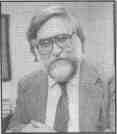 |
Home | Search | Browse | About IPO | Staff | Links |
 |
Home | Search | Browse | About IPO | Staff | Links |
Your Turn
The poor are unstylish now, but their problems are still with us By DOUG DOBMEYER Americans have a love-hate relationship with poor people. While our society is unwilling to put brakes on a free enterprise economy, it does believe in helping to solve some of the problems created by an unfettered private sector. Unfortunately, such help has always been dependent on the whims of the political system. We remain unwilling to tackle the root causes of poverty. On one level, the long-term solution to poverty is simple: jobs that pay a living wage. Yet, while there's plenty of rhetoric devoted to creating jobs for those who want them, we clearly lack a shared value system that would ensure that full employment becomes a permanent reality. There's plenty of evidence in Illinois. It comes in the unwillingness to fund job training for poor people; in the development of employment that doesn't provide decent pay for low-skilled workers; and in transportation systems that aren't geared to finding affordable ways to get poor people from their homes to distant workplaces. Because a permanent full-employment infrastructure has never been put into place, our sympathies are subject to erosion by the new political "reality." The fad in Washington, D.C., and Springfield is that the poor are too expensive and not worthy of being helped. Conservative political leaders preach against government-financed and locally run programs that respond to some of the worst economic problems. In short, we are passing from an era characterized by caring and government mobilization to overcome poverty. Ironically, that era was a response to an earlier period of private market excess. Our free enterprise system ran amok during the 1920s, resulting in the Depression of the '30s. The public sector was left to clean up the mess. During the administration of President Franklin D. Roosevelt, we provided jobs through public works projects and established a system for long-term social security. Roosevelt correctly read the American political spirit of embarrassment over extreme gaps between the rich and the poor. He correctly calculated the political and social necessity of responding to the need for jobs and education — and the role the federal government should play in leading recalcitrant states to do better for their people. To a large extent, he and his successors succeeded. We have lived through a remarkable span of 60 years in the expansion of government's participation in establishing fairness for the American public. People in poverty and those of color were the primary benefactors of that American spirit. Gone were the days of cultural acceptance that "the poor will always be with us." Instead, America endorsed a plan of attack that is based on the belief that the federal government has the primary role to play in being the arbitrator of fairness through civil rights laws, tax policy and programs that will help people in need.
The system ensured that the poor
would have a piece of the American pie.
Some examples:
Now the programs spawned by the New Deal — and the caring impulse behind them — are under severe attack. Although the political battle is not over, our decades-old guarantee of economic security for most Americans could be dismantled. Unless we move now to change the nature of the economic system, we will fail under any political banner. The most difficult issue has always been employment. The federal government spent billions on job training. But it let the states and cities further define employment programs and contract with private groups to carry them out. In the end, all of the job training depended on the will of the private sector. In fact, the success or failure of job training has always sat squarely where the conservatives maintain it should be — with the private sector. But what is required of us is to realize that the free enterprise system cannot exist without some checks. For example, private businesses need to build factories where low-skilled workers can reach the jobs. And the public sector needs to work closely with the private sector to make certain workers can get to a job and are trained to do the work when they get there. We need to ask ourselves what we are doing to establish a permanent structure for the creation of jobs that provide a livable income. The poor may be out of style in this new political reality, but their unstylish problems are still with us. Doug Dobmeyer, a longtime leader on poverty issues, headed the Illinois Public Welfare Coalition for eight years. He just completed a fellowship from the Chicago Community Trust examining media coverage of low-income issues. November 1995/Illinois Issues/33
|